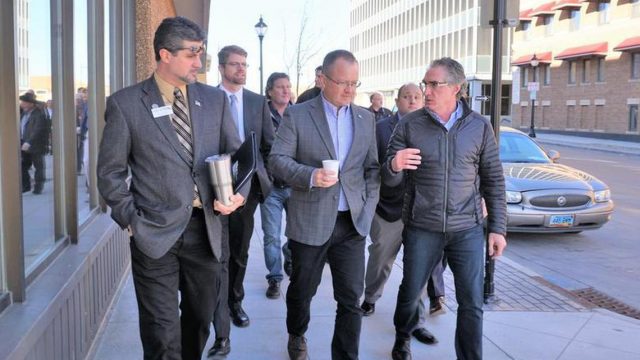Mayor “Discouraged” City Government Will Have to Start Holding Meetings Which Are Accessible to the Public

I like Minot Mayor Shaun Sipma, though I’ll admit I was more enamored with him when he was candidate Sipma pushing for reforms in city government. Since becoming mayor, he’s spent far too much time serving city government as opposed to those who elected him.
In particular, Sipma seems in the thrall of city manager Tom Barry, a man who treats his current job as little more than a stepping stone to somewhere else. Based on conversations I’ve had, and emails I’ve seen, this bureaucrat spends most of his time trying to order around the elected officials.
It’s no credit to the elected officials that they mostly let him get away with it.
But I digress.
Earlier this year, Sipma told us how disappointed he was that the state legislature took away the city government’s ability to jack up fees on citizens living in Minot’s extraterritorial zoning area. That is to say, people who must live under the city government’s jurisdiction but get no vote for who is running that government.
Now Sipma is discouraged after the Attorney General’s Office dropped an opinion, issued in response to a complaint I filed, concluding that the city can’t hold public meetings at which they do the public’s business in another town that’s a two-hour-round-trip drive away.
This is what Sipma told the Minot Daily News about the AG’s opinion:
“Today’s Attorney General opinion sets a precedent in the state because nowhere in state law does it say a municipality cannot have a meeting outside its jurisdiction,” Minot Mayor Shaun Sipma said. “It was never our intention to hold a City meeting that was inaccessible to the public, and we believed we were operating in compliance with the open meeting laws. We have every intention of fully complying with the Attorney General’s corrective measures.”
This is how Barry tried to justify the out-of-jurisdiction meeting to KFYR:
City leaders met for the two-day retreat at the Lewis and Clark Interpretive Center in Washburn from July 31-Aug. 1. They did not make any specific public policy decisions, but discussed broader issues in an effort to give some direction for City Manager Tom Barry.
It doesn’t matter that no decisions were made. Public business was discussed, and that sort of thing must be done in a way that’s accessible to the public. A public servant a bit more concerned with serving the public might recognize this.
[mks_pullquote align=”right” width=”300″ size=”24″ bg_color=”#ffffff” txt_color=”#000000″]Minot’s government choosing Washburn, for no good reason at all beyond some pablum about “team-building, bonding, and brainstorming,” does not cut the mustard.[/mks_pullquote]
As for Sipma, he is right that state law says nothing about local governments needing to hold their public meetings within their jurisdiction. But the law does require the meetings to be open. Section 44-04-19 of the North Dakota Century Code states, “Except as otherwise specifically provided by law, all meetings of a public entity must be open to the public.”
What does “open to the public” mean if not accessible? If, as Sipma suggests, there is no limit on city’s holding extra-jurisdictional meetings, could the Minot City Council convene itself in Minneapolis? Or Hawaii, for that matter?
Of course not. To meet the law’s requirement for openness, there must be some balance where an entity like a city government might want to meet and the public’s ability to get to that location. Minot’s government choosing Washburn, for no good reason at all beyond some pablum about “team-building, bonding, and brainstorming,” does not cut the mustard.
Process matters. How the government arrives at a decision is nearly as important as the decision itself.
If city leaders like Sipma and Barry don’t understand that, perhaps they ought to be replaced by people who do.




